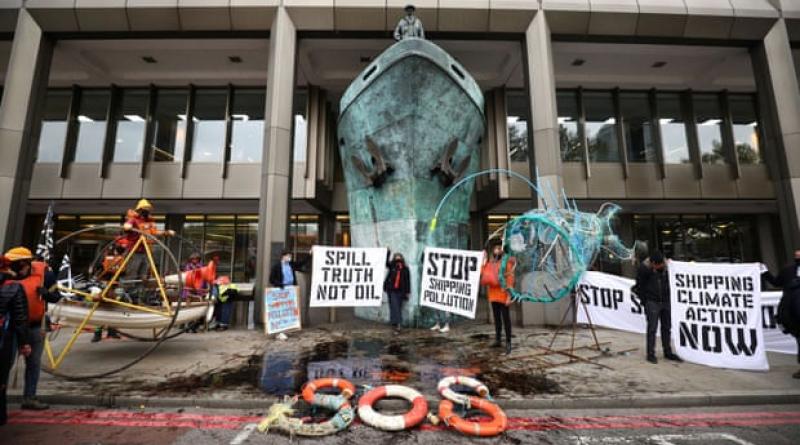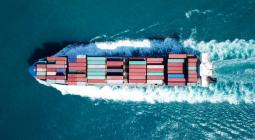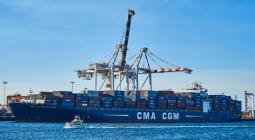Campaigners criticise global deal on carbon emissions from shipping.

Green groups say agreement will allow emissions to continue to rise in the next decade.
Governments have rejected calls for tougher regulation of international shipping, settling instead for new rules on reducing greenhouse gas emissions that campaigners say will imperil the Paris climate goals.
The International Maritime Organization (IMO), the UN body that regulates international shipping, agreed on Friday after a week-long online meeting to make an existing target legally binding: to reduce the carbon intensity of shipping by 40% compared with 2008 levels in the next 10 years.
The conclusions, reached by ministers from around the world despite calls from the UK, Ireland, New Zealand and others for more stringent curbs on emissions, will go forward to the IMO’s marine environment protection committee for acceptance next month.
Campaigners said the deal would allow carbon dioxide emissions from shipping to continue to rise in the next decade, despite warnings from scientists that global emissions need to be brought down sharply over that period.
International shipping accounts for about 2.5% of global emissions, or about 1bn tonnes of CO2 equivalent per year – more than twice as much as the UK’s annual emissions. These emissions are set to double as international trade flows increase, making shipping a key source of carbon emissions, but one that has escaped the attention of policymakers as shipping and aviation have been largely left out of the last three decades of UN climate negotiations.
Guy Platten, the secretary general of the International Chamber of Shipping, said: “This agreement made by governments demonstrates to the world that the shipping industry is firmly on track to meet the ambitious IMO CO2 reduction targets and ultimately be a zero-emissions sector. Industry needs certainty, and this agreement provides a clear signal about the investments we need to make to further reduce our emissions.”
Campaigners said the carbon intensity target, which requires a reduction in CO2 per unit of economic activity, and was first agreed in 2018, would not necessarily result in an absolute reduction in shipping emissions. The overall amount of carbon produced can still increase, even while ships become more efficient.
While their calls for more stringent targets went unheeded on Friday, they will try to prevent the IMO from formally accepting the plans at a meeting next month.
Faig Abbasov, the shipping programme director at the green campaign group Transport and Environment, said: “Governments have ridden roughshod over the Paris agreement by agreeing a measure that will see ship emissions grow for decades to come. The UN maritime agency again showed the world it can only deliver cosmetic changes. EU countries should work through the European green deal to fill the gap left by the IMO.”
John Maggs, the president of the Clean Shipping Coalition, said the proposals were “industry sponsored” and did not reflect scientific advice. “The IPCC [Intergovernmental Panel on Climate Change] made it clear that the next 10 years are crucial if dangerous global heating is to be avoided. The proposal will throw those 10 years away and allow emissions to rise for a decade or more,” he said. “The ICS, who co-sponsored the proposed measure, and other shipping trade bodies must be rubbing their hands together at the prospect of another 10 years of climate-wrecking business as usual.”
Madeline Rose, the climate campaign director at Pacific Environment, said: “This week affirms that shipping, the backbone of our fossil-fuelled global trade system, does not have the capacity to responsibly self-regulate. Apart from the US election, the biggest turning point for the climate crisis may be whether environment and climate ministers can override corporate capture of the IMO and put one of the world’s most heavily polluting industries on an actual pathway towards zero emissions.”
Civil society groups were dismayed by the opaque nature of the proceedings at the IMO, where negotiations happen behind closed doors. In previous years, protests outside the London headquarters provided an opportunity at least for activist voices to be heard, but amid lockdown restrictions that was not possible this time.
“We know from sources that the delegates know about the Ocean Rebellion actions taking place outside the IMO, but there is a difference from them actually being there and experiencing it in person – [there is] a danger of democratic deficit and lack of accountability as more and more horse-trading takes place not even behind closed doors but online,” said Sophie Miller of Ocean Rebellion.
“Some way must be found for civil society’s voice to be heard loud and clear in the corridors of shipping power. We say, enough is enough: shipping greenhouse gas emissions must start to decline rapidly now.”
23 October 2020
The Guardian




